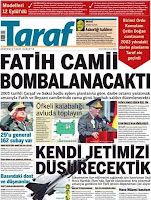Fifty years after the country's most infamous military coup, Turkey finally appears to be strenghening its democratic institutions.
On May 27, 1960, Turkish military officers arrested democratically elected Prime Minister Adnan Menderes, and members of his cabinet. Menderes was placed on a trial before a military-orchestrated special court on charges of treason, and was subsequently hanged. For the last half century, Turkey has been struggling to overcome this original sin in civil-military relations.
Finally, there are some encouraging signs that Turkey has made progress in forging a stable democratic system. Turkish militarists are increasingly the subjects of legal and societal scrutiny -- despite their best attempts to turn back the clock on Turkey's democracy.
Contrary to the views of some Turkish and Western analysts, the primary struggle within Turkey is not between Islam and secularism, but rather between a militaristic pseudo-autocracy and liberal democracy.
In June 2009, the daily newspaper Taraf courageously published what the editors said was a leaked military document that included covert operations to undermine the elected Justice and Development Party (AK Party) government and marginalize its base of support. Among the tactics was the planting of weapons in the dormitories of students sympathizing with Islamic scholar Fethullah Gulen and later confiscating those weapons in order to depict the movement, which is resolutely non-violent, as a terrorist organization.
Attempting to contain the fallout from these revelations, Chief of General Staff Gen. Ilker Basbug rushed in front of the cameras and vowed the document was just a "piece of paper," setting the tone for others in Turkey's nationalist-secularist circles. To them, this could only be a fabrication of the "Islamists," who would like to discredit the military, the self-proclaimed guardian of self-styled secularism. They constantly overlooked reports submitted by top official forensic institutions in Turkey to civilian prosecutors confirming the authenticity of the document. In March, the military prosecution also concluded that the signature on the document belonged to Dursun Cicek, a colonel working for the Turkish General Staff at the time.
In January 2010 Taraf again exposed a mind-boggling story: portions of an approximately 5,000-page-long document involving an alleged military coup plan from 2003, called "Sledgehammer." The scenario described in the documents was explosive: A group of senior officers was deliberating on how to destabilize Turkey to pave the way for a military takeover. Their creative ideas included the deliberate downing of a Turkish fighter jet to escalate tension with Greece and bombing two major Istanbul mosques to provoke social unrest. Consequently, dozens of active duty and retired military officers, among them generals, have been arrested by a civilian court.
The initial reaction of the militarist camp was familiar: denial, cover-up, and accusations of a vast conspiracy by Gulen's supposed sympathizers in the military, the police and the judiciary.
All this points to an unprecedented revolution in Turkish politics. This is the first time in modern Turkish history that the military's lack of accountability is being challenged in such a high-profile way. The generals have accomplished at least four direct military interventions in Turkey over the last five decades and always got away with them. Not this time.
The spirit of Turkey's new reformist trend is best exemplified by a landmark trial and investigation into Ergenekon, an agglomeration of many different groups comprising scores of military officers and militarist civilians dedicated to preserving the crumbling Cold War-era regime in Turkey. According to prosecutors, Ergenekon suspects laid the groundwork for a military takeover by employing vicious tactics, including political assassinations, terrorist bombings, and propaganda directed by the friendly media at the Turkish public.
The Ergenekon investigators had previously discovered the documents, which they say bear the signature of Colonel Cicek, even before they were made public by Taraf. Seized maps led police to the sites of secret stockpiles of military-owned weapons buried underground. The documents also revealed the purpose of such weapons. According to an operation called "the Cage plan," undersigned by numerous military officers, they would clandestinely harass and kill non-Muslim figures in Turkey in order to put the blame on the ruling AK Party.
The militarist lobby has highlighted some of the problems of the Ergenekon investigation, such as early-morning police raids of the suspects and poor wording in the initial indictments. Overall, however, the prosecution's case seems very strong. It is supported by court-ordered telephone wiretaps, seized documents, a large amount of explosives and weapons, detailed assassination plans, and military records. In a country where the military has repeatedly intervened in political affairs, such a conspiracy is not inconceivable.
Encouragingly, the Turkish public has also shown considerable support for the case. Nearly 60 percent of respondents to a recent MetroPOLL survey, conducted in March 2010, expressed support for the detention and arrest of military suspects associated with the alleged 2003 coup plan. A major exception, not surprisingly, are members of Turkey's old guard. In the same poll, nearly 70 percent of Republican People's Party (CHP) voters, a favorite party of the old establishment, disagreed with the indictments.
In the eyes of many CHP voters, the secular state is being weakened under the guise of democratization to lay the groundwork for a theocracy. But though Turkey is a nation of faith, just like the United States, the country has little or no appetite for radicalism or theocracy, even among the most religiously conservative segments of society. On the contrary, major religious conservative elements such as the AK Party and the Gulen movement are openly pushing for more democracy in Turkey. Under AK Party rule, Turkey has met the Copenhagen political criteria, which determine if a country is eligible to join the European Union, and subsequently began accession talks with the EU in 2005. The Gulen movement sponsors its annual Abant Platform series of talks, where a diverse group of intellectuals and public officials discuss how to improve the country's democracy. They are not without fault, but militarists treat almost every influential pious group as Islamists with a hidden agenda.
 |
| Fethullah Gulen |
Reformist liberals such as Orhan Pamuk, Turkey's Nobel laureate in literature, also has been subjected to their share of smear campaigns from the same crowd. Pamuk has publicly said that Ergenekon intimidated and threatened to kill him. It's no surprise that Kemal Kerincsiz, an ultranationalist lawyer who spearheaded legal efforts to curtail Pamuk's right to free speech, has been indicted as an Ergenekon suspect.
The militarist lobby presents the Ergenekon case as a political campaign to silence secularist opposition to the AK Party government and its supporters. But while there have been signs in government circles of increasing discomfort with criticism on the eve of upcoming 2011 general elections, political opposition is largely alive and well in Turkey. Hundreds of secularist, nationalist, and liberal pundits freely criticize the government every day.
What we see occurring in Turkey today is a process of democratization, spurred by growing civilian control over the military. However, due to problems deriving from the country's illiberal constitution, which is a product of a 1980 military coup, progress has not always been smooth. Critics have charged that the Ergenekon investigation has proceeded for a long time without delivering convictions. This is a common and regrettable feature of Turkey's judicial system: Proceedings that started in 1982 against Dev-Sol, an alleged left-wing extremist organization, took 28 years before 39 individuals were finally convicted. The solution is a comprehensive constitutional reform that includes the judiciary. Such a step would not only improve the role of law, but strengthen Turkey's case for European Union accession by harmonizing the country's judicial process with European standards.
The principles of Mustafa Kemal Ataturk loomed large in the minds of the young officers who spearheaded the 1960 coup, and Turkey's military class continues to justify its stance in the name of Turkey's founding father. But Ataturk was essentially a pragmatic reformer whose main goals were modernization and integration with the West. The static, statist, and militarist instincts of Turkey's old guard have only slowed progress toward these objectives. The notion of the "untouchable state" preserved by the military and their comrades has changed dramatically in the last several years, but much work still remains to be done. Despite the objections of his self-declared defenders, Ataturk would be proud.
Published on Foreign Policy, 28 May 2010, Friday


